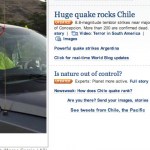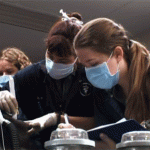Media
Photograph by Benjamin Reed.
Ursula K. Le Guin is a internationally-recognized, award-winning science fiction writer, an elegant badass and the author of such classics as the Hugo and Nebula-award winning The Left Hand of Darkness, The Lathe Of Heaven, and the Earthsea novels. Last year, she began mounting formidable opposition to the Google Books Settlement, an inscrutably complex 303-page agreement reached between the Authors Guild, the Association of American Publishers and Google regarding the Web giant's desire to scan the libraries of the world. The Settlement, if approved -- it…
It really gives me heartburn to see an otherwise sensible article in AOLNews by Katie Drummond with a headline: "Hyping H1N1: Did It Create a Dangerous Flu Fatigue?" I don't know if that was her title or not. Newspapers have headline writers who often seem never to have read the piece they are headlining, but online authors often title their own pieces. In any event, the word in the headline I object to is "Hyping." It implies deliberate exaggeration for ulterior motives.
Did many respectable news outlets do this? Some did, no doubt. They are businesses and news is the commodity they are…
Screen capture of the MSNBC website on February 27, 2010 at ~5:30 PM eastern time.
Most of you have probably already heard about the magnitude 8.8 earthquake that struck today off the coast of Chile. This becomes one of the most powerful earthquakes on record and so far, the death toll has been relatively low - in the hundreds - especially compared to the horrific disaster of the Haiti earthquake from earlier this year. My thoughts go out to all in Chile recovering from the earthquake.
However, I am a little appalled at some of the coverage I've seen for this earthquake. MSNBC has become the…
If you are interested in the topic of science journalism, how it's changing, what's new, and who's who in it, you are probably already reading Knight Science Journalism Tracker. If not, you should start now.
They have recently been digging around and finding projects with which I am involved in one way or another. For example, a few days ago, they profiled science blogs in general and scienceblogs.com in particular, but mainly focused on ResearchBlogging.org which aggregates and gives a stamp of approval to blog posts covering peer-reviewed research. The aggregator is a local thing - it is a…
A video from Cambridge University highlights an infectiously enthusiastic Chris Clemente as he figures out how ants stick to smooth surfaces:
Wow.
Two things strike me about the video. First, they simplified the science for a lay audience without fundamentally changing it. That's something of a rarity, as any scientist who has seen their work covered in the media can attest. Second, they did this while retaining a sense of humor and the strong sense of humanity in the scientific process.
Most scientists I know have a similarly intense fascination with their subjects- that's a rich vein for…
I arrived in San Diego on Thursday night and checked in my hotel that was 6 miles away, almost in Mexico - I could see the lights of Tijuana from the hotel. I had to take a cab each morning and evening.
On Friday morning, I got up bright and early and came to the convention center, lugging my huge and heavy laptop with me. And that was the first surprise of the day - there was no wifi anywhere in the Convention Center, and almost no power outlets anywhere: something I am not used to as the meetings I tend to go to are pretty techie and take care of such details.
Not even speakers/panelists…
Another instance of a really dumb plagiarist, from The New York Times Corrections:
In a number of business articles in The Times over the past year, and in posts on the DealBook blog on NYTimes.com, a Times reporter appears to have improperly appropriated wording and passages published by other news organizations.
The reporter, Zachery Kouwe, reused language from The Wall Street Journal, Reuters and other sources without attribution or acknowledgment.
You work for The New York Times, and you plagiarize from The Wall Street Journal, Reuters, etc.? Seriously. Dude even paid for J-school. Am I…
Everyone knows, because the the Main Stream Media tells us, that bloggers aren't journalists. I freely admit I am not a journalist, not even a science journalist. Of course I do report a lot of science here and I know I do it better and more accurately than many a science reporter, but there are science journalists like Helen Branswell, who is not a scientist, and can run circles around amateurs like me. Unfortunately there aren't many of Branswells in the MSM these days, so when we report what's in a breaking science paper I think we do it as well or better than most non scientist…
Ok, maybe not. But just in case you were wondering why Americans watch the news constantly and know nothing, here's a pretty good example. Coming up next - how to write a completely generic blog post, by yours truly ;-).
The wisest line? At 0:56: "we want to hear what is actually happening, not what people are saying about it". That is the problem with journalism (all media, not just TV) in a nutshell: the #1 reason journalists are very low in the polls of trustworthiness in comparison with many other professions. Safety in quoting, instead of telling it as it is and assigning Truth-values to statements. That is post-modernism: to hell with the facts, what is important is what random people feel about the facts and say about them. The video is funny because it is so true.
Hat-tip: Grrrlscientist
And here is…
That's what New York Magazine is reporting. By spring. I've actually paid for online content before, but generally have let my subscriptions lapse because the net has so much information that it didn't seem worth it. It seems likely that Google News and other aggregators will be the big winner out of this. In many areas The New York Times does have better content (e.g., Carl Zimmer's articles), but the big difference from other newspapers is the breadth of their coverage. It's one-stop-shopping, and most aggregators don't offer much of an advantage. With a price differential they may.
All…
If you get the Smithsonian Channel on your TV, then tune in at 8 pm this Sunday (January 10th) to watch the program Zoo Vets: Claws, Paws, and Fins. Not only does this look like a pretty neat program (from my admittedly very biased perspective), but it features--among others--my girlfriend, Meredith Clancy, and her long-time mentor, Kathryn Gamble, the head veterinarian at the Lincoln Park Zoo. The program, which follows vets at Chicago's Lincoln Park Zoo, Brookfield Zoo, and Shedd Aquarium, was filmed in fall 2008, when Meredith was completing an external rotation at Lincoln Park as part of…
New York Times correspondent Don McNeil is an excellent medical reporter. He always asks intelligent questions at the CDC pressers and he writes good articles. And he's written one for The Times yesterday that I agree with, although his support for it seems to me less than objective. In essence he asked the country's flu establishment how well the US handled swine flu. None of his sources are CDC employees but all of them are deeply involved in flu and flu policy in one way or another. And they gave themselves a big pat on the back. I hope they didn't wrench their shoulders. That might be a…
The year that just ended, 2009, was a year that saw huge changes in the world of media and the world of journalism. Science journalism has also been greatly affected, with many media outlets firing their science journalists first, then firing all the others afterwards. Much virtual ink has been spilled on the topics of "death of newspapers" and "bloggers vs. journalists is over" and "future of journalism", etc.
If you checked out everyone who's registered for the ScienceOnline2010 conference, or followed my posts introducing everyone, you have probably noticed that this, fourth meeting is…
It's the end of the calendar year and the traditional time the media looks back on "the biggest stories of the year." There are websites about almost any subject (even one on a particular model of running shoe, I am told), but those of us who write specialized blogs (as opposed to ones about politics or current events) rarely expect our subject matter to show up on one of those lists. We've been writing about flu for over five years, here, and while re recognized the possibility our subject would come into vogue -- that's indeed why we were writing about it -- it still took us and everyone…
If a publisher offered me a contract to write a book under a title that would be something like "Unscientific America", how would I go about it?
I would definitely be SUCH a scientist! But, being such a scientist does not mean indulging in Sesquipedalian Obscurantism. Being such a scientist means being dilligent, thorough and systematic in one's reasearch. And then being excited about presenting the findings, while being honest about the degree of confidence one can have in each piece of information.
I was not offered a book contract, and I do not have the resources and nine or twelve months…
Update: Show's done. You can listen to the 8-minute segment via Windows Media or MP3/iTunes.
I'll be on New Hampshire Public Radio's Word Of Mouth" noon-hour show tomorrow, Tuesday, Dec 22, talking with host Virginia Prescott about "Orchid Children," my recent Atlantic article about the genetic underpinnings of steady and mercurial ltemperaments. My segment will run about 10 minutes beginning at or just after noon.
Listeners in and near New Hampshire can tune in live at their regular NHPR stations. Others can open up the live stream or tune in via the iPhone Public Radio Player.
I'll post…
The December 2009 edition of the Journal of Science Communication is now online with some intriguing articles - all Open Access so you can download all the PDFs and read:
Control societies and the crisis of science journalism:
In a brief text written in 1990, Gilles Deleuze took his friend Michel Foucault's work as a starting point and spoke of new forces at work in society. The great systems masterfully described by Foucault as being related to "discipline" (family, factory, psychiatric hospital, prison, school), were all going through a crisis. On the other hand, the reforms advocated by…
A nice, thought-provoking interview. Starts with the discussion of Clay Shirky's post Newspapers and Thinking the Unthinkable and the reactions collected by Jay Rosen and discussed in Rosen's Flying Seminar In The Future of News:
Since the clips are set on auto-start, I placed them all under the fold:
tags: Hungry Beast, television, prank, hoax, media watch, ABC, streaming video
The Hungry Beast team takes on the Australian media to see if the journalists can discern fantasy from reality. They fail miserably.



